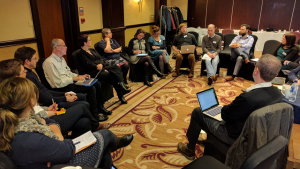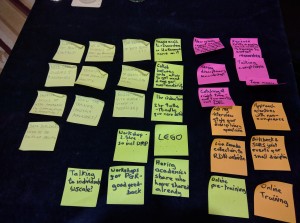Dr Laurent Gatto is one of the participants in the Office of Scholarly Communication’s Open Research Pilot. He has recently blogged about his first impressions of the pilot. With his permission we have re-blogged it here.
Are you in favour of more transparency in research? Are you concerned about research reproducibility? Would you like to get better recognition and credit for all outputs of your research process? Would you like to open up your research and make it more available to others?
If you responded ‘yes’ to any of these questions, we would like to invite you to participate in the Open Research Pilot Project, organised jointly by the Open Research team at the Wellcome Trust and theOffice of Scholarly Communication at the University of Cambridge.
This of course sounded like a great initiative for me and I promptly filed an application.
We had our kick-off meeting on the 27th January, with the aim of getting to know each other and somehow define/clarify some of the objectives of the project. This post summarises my take on it.
Here’s how I introduced myself.
Who are you?
Laurent Gatto, Senior Research Associate in the Department of Biochemistry, physically located in Systems Biology and the Maths Department. SSI fellow and Software/Data Carpentry instructor and generally involved in the Open community in Cambridge, such as OpenConCam and Data Champions initiative.
What is your research about and what kind of data does your research generate?
My area of research is computational biology, with special focus on high-throughput proteomics and integration of different data and annotations. I use raw data produced by third parties, in particular the Cambridge Centre for Proteomics (mass spectrometry data), and produce processed/annotated/interactive data and a lot of software (and also here).
What motivated you to participate in the Pilot?
Improve openness/transparency (and hence reproducibility/rigour) in my research and communication, and participate in improving openness (and hence reproducibility/rigour) more widely.
What kind of outputs are you planning to share? Do you foresee any difficulties in sharing?
My direct outputs are systematically shared openly early on: open source software (before publication), pre-prints, improved data (as data packages). Difficulties, if any, generally stem from collaborators less willing to share early and openly.
A personal take on the project
It is a long project, 2 years, and hence a rather ambitious one, of a unique kind. Hence, we will have to define its overall goals as we go. The continued involvement of the participants over time will play a major role in the project’s success.
What are attainable goals?
It is important to note that there is no funding for the participants. We are driven by a desire to be open, benefit from being open and the visibility that we can gain through the project, and the prospect that the Wellcome Trust will learn from our experience and, implement any lessons learnt. We get to interact with each other and with research support librarians, who will help us throughout the duration of the project. We also commit to sharing of research outputs beyond traditional publications and to engage with the Project, by participating in Project meetings and contributing to Project publications.
A lot of our initial discussions centred around rewards for open research or, actually, lack thereof and perceived associated risks. Indeed, the traditional academic rewarding system and the competitiveness in research leaves little room for reproducibility and openness. It is, I believe, all participants hope that this project will benefit us, in some form or another.
A critical point that is missing is the academic promotion of open research and open researcher, as a way to promote a more rigorous and sound research process and tackle the reproducibility crisis. What should the incentives be? How to make sure that the next generation of academics genuinely value openness and transparency as a foundation of rigorous research?
Some desired outputs
Ideally, I would like that the Wellcome Trust’s famous Research investigator awards to be de facto Open research investigator awards. There’s currently a split (opposition?) between doing research and supporting open science when doing research. In every grant I have written, I had to demonstrate that the team had a track record, or was in a good position to successfully pursue to proposed project. Well, how about demonstrating a track record in being good in opening and sharing science outputs? Every researcher submitting a grant should convincingly demonstrate that they are, have been and/or will be proactive open researcher and openly disseminate all the outputs. By leading by example in the frame of this Open Research Project, this is something that the Wellcome Trust could take away from.
Unfortunately, it is a fact that open science is not on the agenda of many (most?) more senior researchers and that they are neither in a position to be open nor that open science is a priority at all. I find it particularly disheartening that many senior academics (i.e. those that will sit on the panel deciding if I’m worth my next job) consider investing time in open science and the promotion of open science as time wasted of actually doing research. A bit like time for outreach and promotion of science to the wider public is sometimes looked down at, as not being the real stuff.
Another desire is that this project will enable us to influence funders, such as the Wellcome Trust, of course, but also more widely the research councils.
As a concrete example, I would like all grants that are accepted to be openly published beyond the daft layman summary. Published grants after acceptance should include data management plan, the pathway to impact, possibly more, and these could then be used to assess to what extend the project delivered as promised.
This serves at least two purposes. First, it is a way to promote transparency and accountability towards the funder, scientific community and public. Also, it is a great resource for early career researchers. Unless there is specific support in place, writing a first grant is not an easy job, especially given the multitude documents to prepare in addition to the scientific case for support. And even for more experienced researchers, it can’t harm to explore different approaches to grant writing.
Another concrete output is the requirement for a dedicated software management plan for each grant that involves any software development. I certainly consider my software to be equivalent to data and document it as such in my DMPs, but there seems to be a need for clarification.
I believe that I do a pretty decent job in conducting open science: pre-prints, open access, release data, … In the frame of this project, I shall do a better job at promoting open science for its own sake.
I also hope that by bringing some of my projects under the umbrella of the the Open Research Project, I will benefit from a broader dissemination that will, directly or indirectly, be beneficial for my career (see the importance of benefits and rewards above).
Next steps
It is important to make the most out of this unique opportunity. We need to create a momentum, define ambitious goals, and work hard to reach them. But I also think that it is important to get as much input as possible from the community. Nothing beats collective intelligence for such open-ended projects, in particular for open projects.
So please, do not hesitate to comment, discuss on twitter or elsewhere, or email me directly if you have ideas you would like to promote and or discuss.

 Having presented our respective plans to the RDM Forum (
Having presented our respective plans to the RDM Forum ( There are two solutions to this problem which were mentioned during the breakout session. Firstly, some people are using a ‘train the trainer’ approach to involve other research support staff who are based in departments and already have regular contact with researchers. These people can act as intermediaries and are likely to have a good awareness of the discipline-specific issues which the researchers they support will be interested in.
There are two solutions to this problem which were mentioned during the breakout session. Firstly, some people are using a ‘train the trainer’ approach to involve other research support staff who are based in departments and already have regular contact with researchers. These people can act as intermediaries and are likely to have a good awareness of the discipline-specific issues which the researchers they support will be interested in.